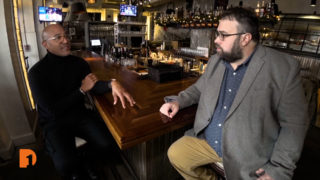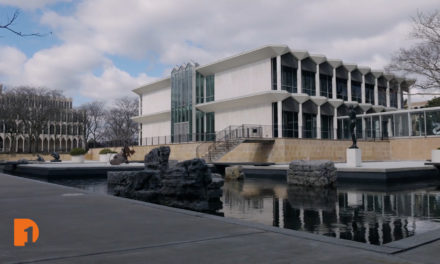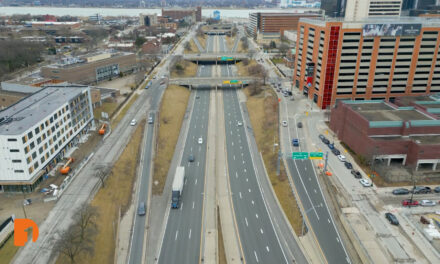Before the pandemic hit Detroit, the city’s streets were filled with workers and suburban commuters patronizing the local retailers and restaurants. Nearly three years later, that scene is mostly gone according to three downtown Detroit business owners and entrepreneuers, who say foot traffic during the weekdays has slowed and the city’s residential density isn’t large enough to help that return.
RELATED: Small businesses coping with challenges ahead of new year
Taking a look at the future of work for Detroit’s hospitality businesses, One Detroit Senior Producer Bill Kubota and Daily Detroit podcast host Jer Staes visits three downtown Detroit business owners and entrepreneurs to talk about the post-pandemic challenges they face and what they see as possible solutions.

Dennis Archer, Jr., a managing partner at Central Kitchen + Bar on Woodward Avenue in downtown Detroit, talks with Daily Detroit podcast host Jer Staes at the restaurant. | Photo by One Detroit
Staes talks with Dennis Archer, Jr., a managing partner at Central Kitchen, along with Coffee Down Under owner Tarun Kajeepeta and Throwbacks Home Owner Bo Shepherd, about how the city can work to have residents return to downtown and what changes they’re hoping to see for the future of downtown Detroit.
Full Transcript:
Jer Staes, Host, Daily Detroit: As 2023 starts in downtown Detroit, I wanted to take a look ahead to see what some may think the future holds. I talked to three entrepreneurs in hospitality and retail about their experiences. A huge impact is the shift to working from home.
Dennis Archer Jr, Managing Partner, Central Kitchen: We, just this morning, had a meeting at one of my companies talking about what will be the 2023 kind of hybrid model. How many days in the office? What are those days?
So, everyone’s trying to figure out how to manage through what is an unpredictable and unforecastable number of bodies coming through our door every day at the lunch hour. Fridays and Saturdays and Sundays have been phenomenal. Our Sunday brunch numbers are probably 50 to 60% higher now than pre-pandemic. I don’t know why.
Jer Staes: Dennis Archer Jr’s Central Kitchen is just off Woodward next to Campus Martius. Over in the financial district, a coffee shop, Coffee Down Under.
Tarun Kajeepeta, Owner, Coffee Down Under/Shelby: And it’s palpably obvious down here. You can sit on Shelby Street and not see a person walk by for 10 minutes in the middle of the day on a Wednesday, right? And I think that’s kind of… You know, we’re hoping that changes.
Jer Staes: The coffee shop down the steps, also a front for a speakeasy behind the blue door featuring custom libations, and what was one time a bank vault, the place hopping on a cold, January, Saturday night.
Tarun Kajeepeta: I understand the merits of flexible work, and I’m supportive of that but Detroit is actually more emblematic of the rest of the country than a lot of big cities like New York or L.A., for example, which are more their own thing. We need commuter traffic. You need people from the suburbs coming down here and spending time.
These businesses are predicated upon that. We don’t have enough residential density in the city to support the number of restaurants that we have. We need people to come back at least a few days a week and really encourage patronizing local businesses to help them succeed because we can’t just succeed on Friday and Saturday. You know, it’s just not enough.
Jer Staes: Throwbacks Home launched in downtown Detroit after the pandemic. They’re a furniture retailer and interior design showroom.
Bo Shepherd, Owner, Throwbacks Home: It’s been great. I mean, like I said, there are no furniture stores down here. And so, I think the response has been extremely positive. The first week we’re open, I want to say, 50% of the people who are coming in knew about us and wanted to see and support us. And the other half were just people who were curious. Now we’re teetering into more than 70% of people have never heard of our brand, which is amazing because we’ve been around since 2014. So it’s a blessing and I’m just really excited to be down here.
Jer Staes: As you can see, sometimes a story has multiple sides, but for those experiencing challenges, what are some possible solutions? What do you think of some of the plans to increase more residential? There’s even been talk of converting some buildings that were offices into residential. Do you think that would benefit you?
Dennis Archer Jr: Yeah. I mean, the more people that are living downtown, I think the better. If you look at, for instance, what happened in downtown Birmingham versus in downtown Detroit. Downtown Birmingham, as soon as all those places got opened, they were open. They were back almost the same exact hours because there’s a density of people living.
And so there, where you have people that are living, and maybe they’re not going to work, that actually helps the restaurants that are in downtown Birmingham because those people are staying at home, but they want to get out to go to lunch, they want to go to happy hour, they want to go to brunch. And so the more people that live downtown, accompanied by more people on a regular basis coming back to the workplace, I think it’s going do more to the benefit of all of us that are in hospitality and retail.
Tarun Kajeepeta: So one, I feel very strongly that we should rethink zoning in this city. I think zoning creates a lot of challenges for development and inhibits development that is, frankly, unnecessary in my mind.
Jer Staes: Expand on that a little bit more, actually.
Tarun Kajeepeta: Yeah. The idea that the city dictates what type of activity… I think it stems from yes, I would not like to have a nuclear power plant across the street from my residence. But it doesn’t mean that there should be such specificity around what type of retail business can be at this corner versus another corner. Can I build a single-family home or a four-unit? North Corktown, for example, I’ve invested a fair bit. There are a lot of vacant lots. I’d like to see something there, and I don’t really think we should be that particular. If it’s going to be residential, let’s just allow it to be any form of residential.
Jer Staes: I asked these three, whose opinions I all value immensely, what about the future?
Bo Shepherd: What is my hope? Oh, God. I mean, I just hope that we can keep evolving. I feel like since we started, all I’ve been doing is evolving. We have some really exciting collections that we want to launch out that I honestly think we can only really launch down here. I’m looking forward to the unknown. That’s what I could say.
Tarun Kajeepeta: I’m really excited for the train station development and that greater vision for Corktown. I really hope we get it right. I know a lot of money is being put into it. A lot of great people are working on the project. I hope Ford is able to actually get people into the space. Right now, the property values reflect a vibrant community there, which doesn’t exist yet because these buildings aren’t occupied. And that’s a big one. I think, for 2023 in Detroit, I really hope that one lands.
Dennis Archer Jr: I don’t want to start with business. I would say that people should spend time with and be thankful for family and friends. We’ve seen a number of losses over the last year, so I would put that ahead of business. And what I would say is a wish is just for those who have not endeavored down here to give it a shot. Because any time someone comes down here, either for the first time or they haven’t been here for a long time, they’re wowed. My wish would be to give us a shot and come on down.
Stay Connected:
Subscribe to One Detroit’s YouTube Channel & Don’t miss One Detroit Mondays and Thursdays at 7:30 p.m. on Detroit Public TV, WTVS-Channel 56.
Catch the daily conversations on our website, Facebook, Twitter @DPTVOneDetroit, and Instagram @One.Detroit
View Past Episodes >
Watch One Detroit every Monday and Thursday at 7:30 p.m. ET on Detroit Public TV on Detroit Public TV, WTVS-Channel 56.




